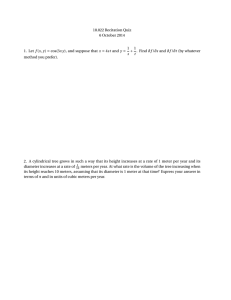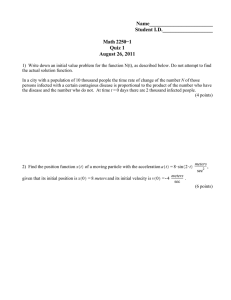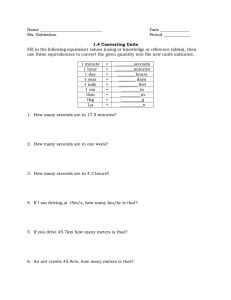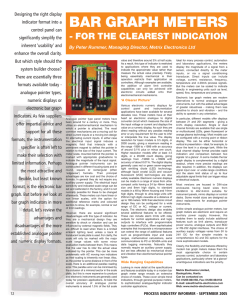Bar Graph Meters - Metrix Electronics
advertisement
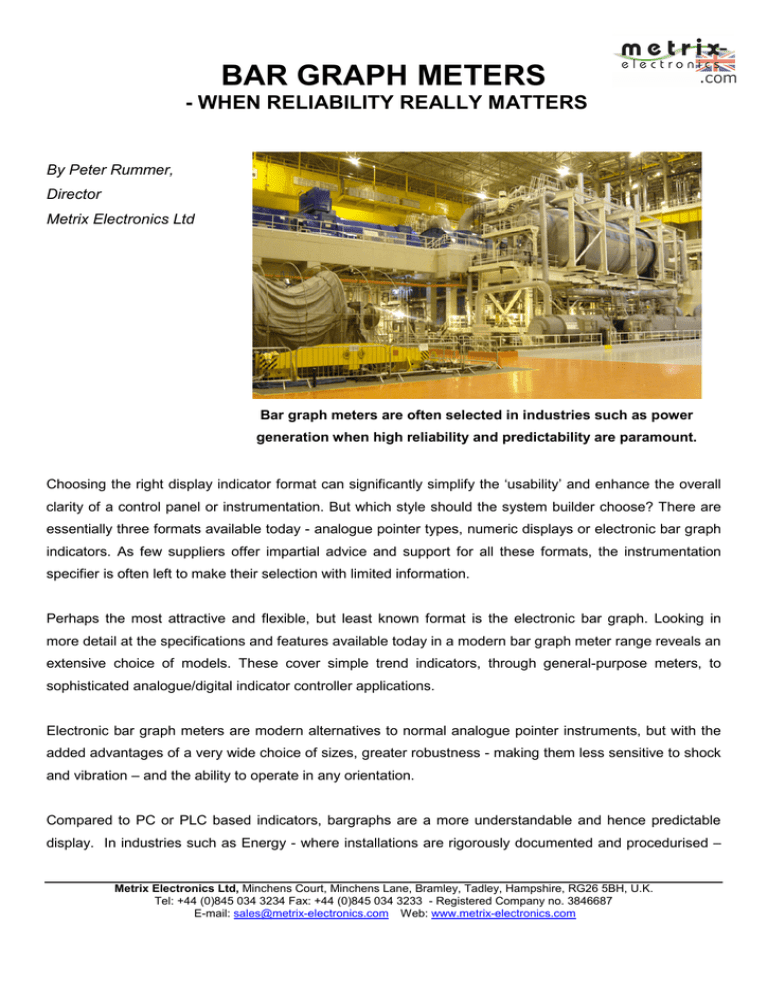
BAR GRAPH METERS - WHEN RELIABILITY REALLY MATTERS By Peter Rummer, Director Metrix Electronics Ltd Bar graph meters are often selected in industries such as power generation when high reliability and predictability are paramount. Choosing the right display indicator format can significantly simplify the ‘usability’ and enhance the overall clarity of a control panel or instrumentation. But which style should the system builder choose? There are essentially three formats available today - analogue pointer types, numeric displays or electronic bar graph indicators. As few suppliers offer impartial advice and support for all these formats, the instrumentation specifier is often left to make their selection with limited information. Perhaps the most attractive and flexible, but least known format is the electronic bar graph. Looking in more detail at the specifications and features available today in a modern bar graph meter range reveals an extensive choice of models. These cover simple trend indicators, through general-purpose meters, to sophisticated analogue/digital indicator controller applications. Electronic bar graph meters are modern alternatives to normal analogue pointer instruments, but with the added advantages of a very wide choice of sizes, greater robustness - making them less sensitive to shock and vibration – and the ability to operate in any orientation. Compared to PC or PLC based indicators, bargraphs are a more understandable and hence predictable display. In industries such as Energy - where installations are rigorously documented and procedurised – Metrix Electronics Ltd, Minchens Court, Minchens Lane, Bramley, Tadley, Hampshire, RG26 5BH, U.K. Tel: +44 (0)845 034 3234 Fax: +44 (0)845 034 3233 - Registered Company no. 3846687 E-mail: sales@metrix-electronics.com Web: www.metrix-electronics.com bargraphs avoid the debugging inherent with software-driven devices such as plasma or LCD screen displays. Ideal for many process control, automation and laboratory applications, the meters display the magnitude of a signal from a sensor, connected directly to the meter inputs, or via a signal conditioning transducer. Direct inputs can include voltage, current, resistance, frequency, temperature and 420mA process signals. But the meters can be scaled to indicate directly in percentage or physical units such as level, speed, flow, temperature and pressure. Viewable from 10m or beyond Particular models offer bar graph scale lengths from a modest 50mm to the ultra-large 1000m, having between 21 and 201 segments. The largest models can easily be viewed from a distance of 10m, or more. Single or dual channel formats are available that use single or multicoloured displays. Most models can be configured with a moving point or ribbon display. This can be either horizontal or vertical in presentation – ideal, for example, to show the level in a storage tank - while the dual channel display format provides rapid indication and comparison between two signals ‘at a glance’. In some models the bar graph display is complemented by a digital readout when more precise readings are also required. In addition, the displays can signal input over- or under-range conditions and the alarm limit status of up to four adjustable signal limits that can trigger relays or electrical outputs. Most versions are housed in DIN-size enclosures having case sizes from 75mm to an enormous 1150mm in height. Suitable for instrument panels, mimic displays or control desks. Unlike simple analogue pointer meters, bar graph meters are electronic and require an auxiliary power supply. However, this enables them to easily include additional features such as limit alarms, transducer power supply, analogue outputs and BCD or RS-232 digital interfaces. The choice of auxiliary supply voltages varies from 5V to 24V DC for the simpler models to comprehensive AC and DC options for the more sophisticated models. ‘at a glance’ indications Clearly, the flexibility, wide choice of sizes and features offered by modern bar graph meters makes them the most appropriate choice in certain process engineering, automation and laboratory applications particularly where ‘at a glance’, unambiguous indications are the priority. Metrix Electronics Ltd, Minchens Court, Minchens Lane, Bramley, Tadley, Hampshire, RG26 5BH, U.K. Tel: +44 (0)845 034 3234 Fax: +44 (0)845 034 3233 - Registered Company no. 3846687 E-mail: sales@metrix-electronics.com Web: www.metrix-electronics.com

